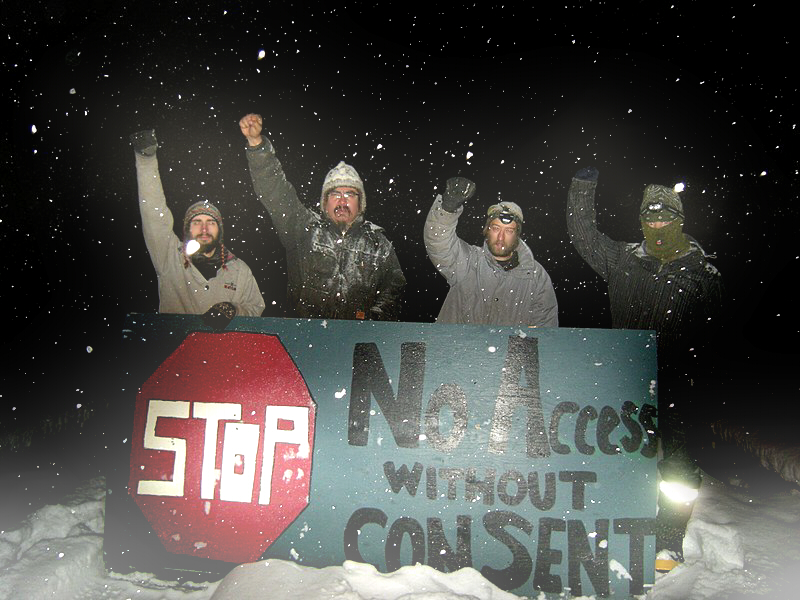The Wet’suwet’en people vs. modern imperialism
The Wet’suwet’en people protest the natural gas pipeline being enforced upon their land, much to the Canadian government’s dismay.
February 28, 2020
The Wet’suwet’en people are now in a mass protest against the nonconsensual implementation of a new pipeline on their land.
The Canadian government, however, remains apathetic due to the compromises and projections stated by Coastal GasLink. Coastal GasLink is the company that outlined a natural gas pipeline that would go directly through Wet’suwet’en land. According to the pipeline overview, this 416 mile pipeline offers up to 2,500 “high quality” jobs, $21 million in property benefits and ongoing community investments.
The pipeline was greenlit in 2014 until it was discovered that the hereditary chiefs of Wet’suwet’en opposed it. The BBC reports that 28 percent of the pipeline goes through Wet’suwet’en land and that Wet’suwet’en camps were made along the pipeline route. The Canadian government placed an injunction order and has recently started to enforce it. This has led to multiple arrests from the Royal Canadian Mounted Police (RCMP) with one officer stating they are “sterilizing the site.”
They have militarized, tracking enemy territory in green suits with helicopters, drones and heat sensing cameras. The RCMP escalation is more than a presentation, with an RCMP official stating they would stay “as long as deemed necessary” and one document suggesting the arrests of Wet’suwet’en children at the blockade.
“The police are here to support the invasion of Indigenous territories,” said Tlingit land defender Anne Spice. “It is what they’ve always done. Now, they watch us when we travel to pick berries. They ‘patrol’ the roads where we hunt. They harass us and profile us under the guise of ‘public safety.’”
The history of Canada and imperialism towards Native Americans is similar to imperialism in other North American countries. This modern imperialism involving the pipeline opens a past of child abduction, forced assimilation and appropriating tribal lands. Child abuse is a central controversy as 150,000 Native children were taken and placed into boarding schools, an act considered cultural genocide. Canada has redirected Native lands to the extent of categorizing them into “First Nation” and “Inuit” people. The House of Commons that passed a unanimous National Indigenous History Month stands on First Nation land.
“Ever since colonization, the aim has been to dispossess our people from our lands. To impoverish us. To assimilate us. To eliminate us. We know that our self-determination, our sovereignty, our very identity, is based on us having control over our lands,” said Dr. Karla Tait, an Indigenous protester.
The RCMP eventually cleared protesters off the pipeline pathway, unknowingly evolving the pro-Wet’suwet’en into a blockade. This is stopping rail traffic in Quebec, Ontario and British Columbia, and it has expanded enough for the Canadian National Railway to close operations east of Canada. This has brought national attention to the situation, prompting Prime Minister Justin Trudeau to speak on the issue during a press conference, discussing the situation as a crisis.
“Canadians have been patient, our government has been patient, but it has been two weeks and the barricades must come down now,” said Trudeau. “I want to assure Canadian citizens that we are engaging at all levels to resolve this quickly and mitigate the very real impacts of these blockades on people.”
Trudeau also claims that the “law must be upheld,” neglecting how the Wet’suwet’en people have asked for the same on Canada’s part. These blockades have made a negative impact economically, causing 1,450 layoffs between the two largest railway companies in Canada. Farmers are having shortages in propane leading to trouble heating livestock and slowed grain deliveries. Ports crowded with freight and 50 ships cannot unload in Vancouver. While both parties have shared dialogue on the issue, neither have agreed on the subject.
“This is far from over, we’ve had day after day of invasion and we’re still here,” said protester Molly Wickham. “We’re still not giving up.”








